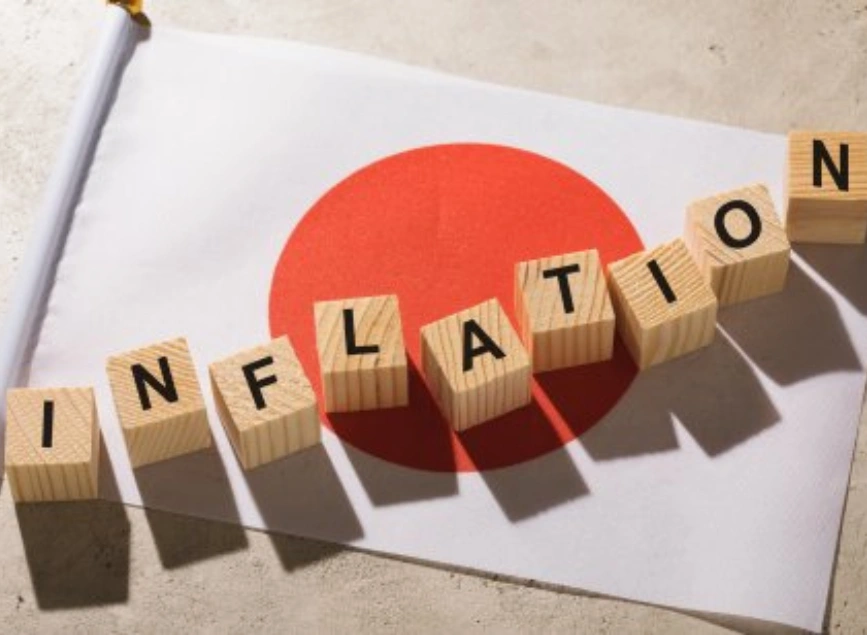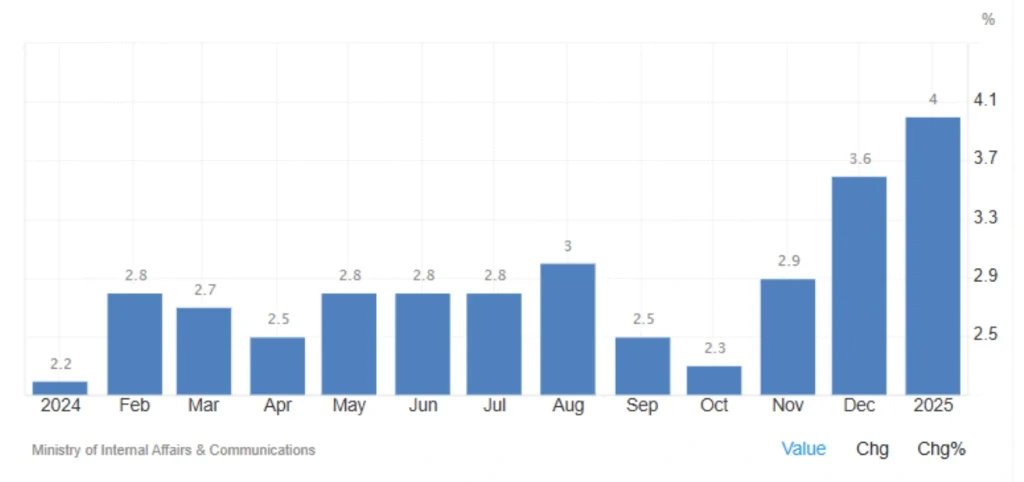
Japan’s Annual Inflation Rate Rises in January 2025
Japan’s inflation rate rose to 4.0% in January 2025, up from 3.6% the previous month, marking the highest level since early 2023. This sharp increase is raising concerns about the rising cost of living, potential changes in monetary policy, and broader effects on financial markets.
What’s Driving Japan’s Rising Inflation?
Several factors have fueled Japan’s rising inflation, with food and energy prices at the forefront. Here’s a closer look at the main contributors.
Sharp Increase in Food Prices
Food inflation surged by 7.8%, marking the largest increase in 15 months. This jump is primarily due to rising prices for fresh vegetables and other perishable items, driven by higher production and transportation costs.
Energy Subsidy Cuts Fuel Price Hikes
The removal of government subsidies for electricity and gas in May 2024 has significantly affected household energy bills. Electricity prices climbed by 18.0%, while gas prices increased by 6.8%, adding financial pressure on consumers.
Cost of Living Continues to Climb
Inflation has also spread across several essential sectors:
- Housing increased by 0.8%
- Clothing rose by 2.8%
- Transportation saw a 2.0% rise
- Household goods climbed by 3.4%
- Healthcare went up by 1.8%
- Recreation increased by 2.6%
- Miscellaneous goods rose by 1.4%
On the other hand, communication costs dropped by 0.3%, and education expenses fell by 1.1%, providing some relief in those areas.
Core Inflation Surpasses Expectations
Japan’s core inflation rate, which excludes food and energy prices, rose to 3.2% in January, exceeding market expectations of 3.1%. This is the highest level recorded in 19 months.
The Consumer Price Index (CPI) also recorded a month-over-month increase of 0.5%, indicating continued upward pressure on prices across various sectors.
Why Is This Inflation Surge Important?
This increase in inflation has significant implications for Japan’s economy, financial markets, and future monetary policy decisions.
Pressure on Household Budgets
As inflation rises, household purchasing power declines, making it harder for families to maintain their standard of living as the cost of basic goods and services increases.
Bank of Japan Could Adjust Monetary Policy
The inflation spike could force the Bank of Japan (BoJ) to reconsider its current monetary policies. The central bank might raise interest rates or scale back stimulus measures to prevent inflation from climbing further.
Potential Market Reactions
Higher inflation could lead to shifts in financial markets:
- The Japanese yen may weaken as inflation rises
- The stock market could face pressure if higher production costs cut into corporate profits
- Government bond yields may increase as inflation typically drives up interest rates
Read More: Japan’s Consumer Confidence Dips in December
Economic Analysis: What’s Fueling Japan’s Inflation?
Several economic factors are contributing to Japan’s rising inflation rates.
Rising Costs in Food Production and Transportation
The price of fresh produce has surged due to increased costs in production and transportation, largely driven by global supply chain disruptions and rising fuel expenses.
Energy Subsidy Removal
The removal of government energy subsidies has led to higher electricity and gas prices, impacting both households and businesses across the country.
Climbing Living Expenses Across the Board
The overall cost of living has risen due to increases in housing, clothing, transportation, and household goods, placing additional financial pressure on consumers.
What Could This Mean for Japan’s Monetary Policy?
The Bank of Japan now faces growing pressure to respond to the inflation surge.
Potential Interest Rate Hikes
The BoJ may consider raising interest rates to help control inflation. While this could help stabilize prices, it might also slow economic growth and impact borrowing costs for businesses and consumers.
Scaling Back Easy Money Policies
The central bank could begin tightening its monetary policy by reducing stimulus measures, which would mark a significant shift from its traditionally low-interest-rate environment.
How Will Japan’s Inflation Surge Impact Financial Markets?
A Weaker Yen on the Horizon?
Rising inflation could weaken the value of the Japanese yen against major global currencies, affecting international trade and investment flows.
Stock Market Volatility
Higher production costs could reduce corporate profits, potentially leading to increased volatility in Japan’s stock market.
Rising Bond Yields
As inflation climbs, investors may demand higher returns on government bonds, leading to increased yields and potentially higher borrowing costs for the government.

Inflation: What You Need to Know
What Is Inflation?
Inflation refers to the gradual increase in the overall price level of goods and services in an economy over time.
- The inflation rate measures how much prices have changed compared to the same time the previous year
- Core inflation excludes food and energy prices, which tend to be more volatile, to provide a clearer picture of long-term inflation trends
Why Does Inflation Matter?
- High inflation reduces the purchasing power of consumers, making it harder for households to afford everyday items
- Central banks use inflation rates to adjust interest rates and maintain economic stability
- Inflation can influence economic growth, employment rates, and borrowing costs
Inflation’s Effect on Financial Markets
- Inflation can weaken a nation’s currency, reducing its value on the global stage
- Higher inflation can cut into company profits, potentially impacting stock market performance
- Government bond yields often rise as inflation increases, leading to higher interest rates
Looking Ahead: What’s Next for Japan’s Economy?
With inflation reaching 4.0% in January 2025, the highest level since early 2023, Japan faces a challenging economic landscape. Rising food prices and the removal of energy subsidies have been key factors behind this surge, while core inflation climbing to 3.2% has surpassed expectations.
The Bank of Japan may soon feel pressure to adjust its monetary policies to curb inflation, potentially leading to higher interest rates and tighter financial conditions.
Share
Hot topics

Trading with price action
When they start, most traders will believe that they must discover the ideal indicator for success. At otet markets, we see this every day.They test a variety of indicators, including...
Read more




Submit comment
Your email address will not be published. Required fields are marked *